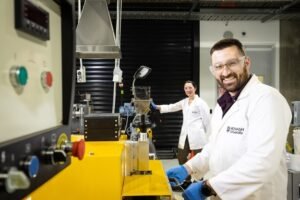Friday, 27 February 2026

November 4, 2025 | Beverages
From Field to Functional Food: Sorghum Synbiotic Beverages Promote Health and Sustainability in Brazil
Professor Hercia Stampini Duarte Martino, Department of Nutrition and Health, Federal University of Viçosa (UFV), Viçosa-MG, Brazil This study was coordinated by Professor Hercia Stampini Duarte Martino from the Department…

October 30, 2025 | Australia
La Trobe University launches $27Mn Protected Cropping Hub to boost sustainable, high-quality food production
This five-year collaboration involves three research institutions, six industry partners, and the Australian Government La Trobe University has officially launched the Australian Research Council (ARC) Industrial Transformation Research Hub for…

October 29, 2025 | Company News
Utah State University analysis finds diestel regenerative turkeys deliver superior nutritional benefits
This expanded analysis found that regenerative farming practices consistently yield turkeys with higher levels of antioxidants, a better fatty acid balance, and more essential vitamins Just in time for Thanksgiving,…

October 29, 2025 | Australia
FaBA partners with SeaStock to boost algae-based ingredient innovation
The project, titled “Extraction and characterisation of techno-functional ingredients from Australian seaweed” Australia’s Food and Beverage Accelerator has invested in SeaStock Pty Ltd to accelerate the commercialisation of clean-label ingredient…

October 24, 2025 | Australia
QUT signs MOU with Japan Bioindustry Association to advance bioindustries
This includes the QUT Pioneer BioPilot, based in Mackay, which has recently undergone a $18 million upgrade, transforming it into Australia’s leading pilot-scale fermentation facility QUT has signed a Memorandum…

October 24, 2025 | Interaction
FoSTAT Award-Winning Pork Knuckle Trio redefines healthy Thai cuisine for seniors
Assoc. Prof. Kanitha Tananuwong, Department of Food Technology, Chulalongkorn University In Thailand, few dishes evoke as much comfort and nostalgia as braised pork leg. But for older adults, the high…

October 17, 2025 | Food
Engineering Nutrition: Marico’s R&D Push to Redefine Everyday Wellness
Dr Shilpa Vora, Chief R&D Officer, Marico Limited At the forefront of India’s evolving food innovation landscape, Marico Limited is redefining how science, sustainability, and consumer-centric design intersect in everyday…

October 15, 2025 | Academic
Chulalongkorn University students reimagine Thai classic with health-conscious Pork Knuckle Trio
The innovation earned the team the Second Runner-up Award at the FoSTAT Food Innovation Contest 2025 A student team from Nutrinex, the Department of Food Technology at the Faculty of…

October 8, 2025 | Australia
Australian scientists create natural plastics for everyday packaging
The researchers produced films that behave like conventional plastics and can be moulded into other shapes or solids Australian Researchers have transformed food waste sugars into natural plastic films that…

September 25, 2025 | Company News
MARMADE to harness marine biomass for innovation in food and feed ingredients
MARMADE aims to advance biorefinery processes that extract bioactive compounds for innovative food and feed prototypes with improved nutritional properties With the global population projected to reach 9.8 billion by…
Technology
Ingredion Thailand Achieves 100% Sustainably Sourced Cassava
Feb 27, 2026 | Company News
Deakin University and Bellarine Foods Partner to Develop Sustainable Marine-Derived Proteins
Feb 26, 2026 | Australia
Royal Unveils Refreshed Jute Bag Design for 20lb Authentic Basmati
Feb 25, 2026 | Company News
Food Testing
Australian Medical Bodies Push for Compulsory Health Star Labelling
Feb 24, 2026 | Australia
Tim Hortons Singapore Secures Majlis Ugama Islam Singapura Halal Certification Ahead of Ramadan
Feb 23, 2026 | Company News
More Popular
Fagron Acquires Pharmavit Europe for €68Mn to Expand Nutraceutical Portfolio
Feb 27, 2026 | Company News
Arla Foods Invests EUR 300Mn in New Cheese Dairy in Sweden
Feb 27, 2026 | Company News
Beyond Meat Broadens Portfolio Beyond Protein with Sparkling Plant-Based Drink Line
Feb 27, 2026 | Beverages






